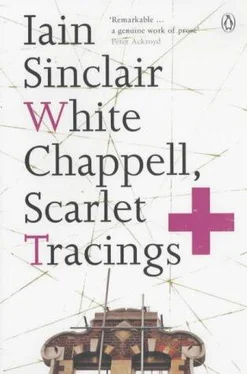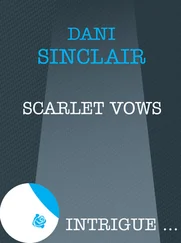‘The great synthesis travels in a sealed cab. Stars move across the pitched roof, the coracle lid: at the velocity of Gull’s breath. Compressing his time. Making incisions, making sacrifice. Gull, the literalist, made act, made complete, did . Or Hinton would have been nothing.
‘Gull, the ironist, not needing to believe, oversaw the slaughter of five women. Coldly; unattached to his actions. Buried one threat. Earthed one terror. Made sacrifice that the new century could be born. He aborted his own future.
‘He was a victim. He could not escape the acts he had to perform. The will of the victims was as great as his own: rushing together into annihilation, each serving the other.’
Joblard now was sketching rapidly, black contours, rib and vein, the heart’s heart, the labyrinth of the secret city, the temperature-graph of the dying stones: neutralising the spread of madness.
We made our way back, Hanbury, Spital, Woodseer, to the brewery gates. A visit. It is my instinct: never go back. To return is to remake what is. But Joblard, having no past, cultivates the pieces of the immediate that can still be reached.
The gift of friendship, the knack of making demands: it is kept alive.
The ullage men are dozing behind their guts in the concessionary bar, only slightly inhibited by a made-up front-office man drinking with two plumbers and a girl they have brought back from the Seven Stars. They have connections, involvement with doubtful invoices, the juggling of delivery notices. Lightweight suits like oil slicks, cheap cigars. They punctuate their remarks with sudden touches on the woman’s shoulders, leaving incipient bruises in her soft flesh. They are pouring doubles into her, promising the full tour.
‘How’s the old feller, then? Still around?’
‘Dead. You didn’t know? Six months back. Dead and buried.’
‘Old Eves, he’d been working on it a long time. It’s what he was waiting for.’
‘Fuck Eves! He’s still running around, the old wanker. He’ll be dying for the next thirty years. He’ll see you out, mate.’
‘Who then?’
‘Brandon. Cut him open, didn’t they? Full, mate. Every fucking inch of him. Packed, he was. Cancer. He was drinking in this bar on the Friday — they had him six feet under in Tower Hamlets by the Tuesday. Suit him there, nobody checking up on him. He never changed, like a skeleton. No teeth. Finished up his pint, didn’t he? Got another one in, didn’t refuse. But he never fucking drank it.’
The chaps, the well-connected trio, take the girl out, tip-a-toe on stilt heels, laughing, over the cobbled yard of the cooperage.
‘Come on, boys. We’ll follow them.’ Ullage boss as voyeur. ‘Might get some fucking leftovers.’
Down the dray-walk, into the stables, a suggestion of rats at her ankles, the girl obligingly lifting, shaking, her tight skirt; a run in her stocking. The exact extent of the damage to be assessed by the man from the front-office.
Then by tunnels and walkways, a route that involves many ladders. The girl follows one of the plumbers, the office man at her rear, closely guarding against any danger of her falling by resting his manicured hands on her buttocks. They pass gleaming tanks, skimming baths, hoppers; they enter the cold store, along Hanbury, chilled porter, the shunned corner, the ground where the body of Annie Chapman was discovered, turned out at Dorset Street, ‘the worse for liquor and potatoes’. The plumbers go no further, not worth the candle; a tap and a bucket. They sit on the stone floor, passing the bucket between them, sharing a song.
The office man wraps his jacket around the girl’s shoulders, an overcoat, scarlet lining; manages at the same time to disengage the straps of her dress. He warms her with a long pull at his flask.
Our quest is unfocused. We join the plumbers on the deck. Seminal promptings frozen; we float once more in the direction of decay.
‘She’ll bite it off!’
‘To the brim, John. Fill her right up.’
The bucket carried unsteadily back; it spills, soaking the plumber’s overalls.
A scream.
The plumber sits up too suddenly, gashing his head on a brass tap. Blood down his cheek. A scream that freezes us to our shadows.
We blunder. There are so many doors, ladders, steps, dead ends, blind passageways. We dip under pipes, lacking Brandon the guide, the rat among secrets. A long floor, out of the darkness, grain over boards, high arched ceiling; a pulsing of machine breath, nerve dials.
And in the powder, on the floor of this glass-wall’d chamber, a line of footprints, leading our eyes to the man, head on his knees, nursing an aluminium pipe.
The girl, now virtually naked, jacket slipping from her shoulders, hurls herself against a window; it shatters. She drags her wrist backwards and forwards across the jagged glass edge, screaming madly: bands of light from the shuttered roof stripe the nave, white dust floating in immaculate columns.
To: Sarah Hinton
8 Finsbury Square
July, 1861
My dear Sarah,
Where do you think I am now? I am at Dr Gull’s. I have taken up my abode here for a week or so, to do a paper with the Doctor, the one we were talking about before.
I was so filled with my ideas, swollen and exultant, absorbed in my schemes and projects when I saw you, that I did not even tell you where you could find me.
I want time for the thoughts to mature, so that they may present themselves in fit shape, and not need to be worked up.
The Doctor listens, an owl in a green waistcoat, bottled in his window seat, the light behind him, his feathers all on fire. I cannot read his expression, his approbation or his censure. I believe that he looks at my chair and sees nothing. I am invisible — but my words go for him like hornets, and they sting!
His right hand always resting on his abdomen, feeling every breath as it escapes, so infernally calm, so contained, with all the complacency of an expectant mother. Those heavy caterpillar eyebrows! That remote eye! He seems to have welcomed my train of thought before I have launched it from the platform.
And now he is such a great man in the world, his wife and family live at Brook Street — his old surgery in Finsbury he maintains as bachelor quarters, so that we can talk without disturbance; talk, talk, talk! I am sure that I weary him, but he gives no sign. Indeed it begins to come on me that I do no more than save him from the exertion of articulation, of defining, working down to what does not need to be said. The smoothed cap of hair! The high stiff collar! The very portrait of a successful physician. He has painted himself and disappeared into his own likeness.
But I owe so much more than I can tell to Dr Gull, our walks together, each morning, the divisions of the city as yet unpolluted by the traffic of mere business. And our walks at night into the dark heart, the gutters, the veins of corruption. So much of the inspiration for The Mystery of Pain lay not in secluded study or in quiet contact with nature, but in the back streets and slums of Whitechapel. Evil, Sarah, is a stained glass window with a glowing reality behind it; it is radiant with martyr and saint, with the divinest meaning just beyond our sight.
I thank God there is so much ugliness and evil. I clasp evil and wrongness to my heart; they are life, they are God’s tenderest love. He says to me in them, ‘Look, my child, and tell me what I am doing; ’tis painful to you at first, but you will love it when you see it.’
The thought of the mystery of pain is the seeing our life again as a Fluxion. The feeling of pain is an element brought into the self-form by isolation. This I have suffered, but not for my redemption. It is not until we look upon pain as a willing sacrifice that it becomes pure good. I have refined self in pain and refined pain until it is a force in my work. It was of use, no more. The highest good of everything is its making possible a better thing, a thing not possible except for it.
Читать дальше












